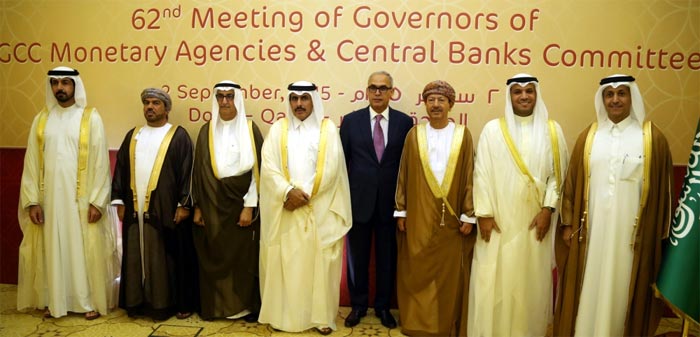Qatar Central Bank Governor HE Sheikh Abdullah bin Saud al-Thani with other senior executives during the 62nd meeting of the Committee of Governors of GCC Central Banks and Monetary Institutions in Doha on Wednesday. PICTURE: Jayan Orma.
Qatar has issued QR15bn ($4.1bn) of bonds as the country takes advantage of borrowing costs to replenish funds eroded by the decline in oil prices, a Bloomberg report says.
The sale, intended to boost the local capital market, was four times oversubscribed, Qatar Central Bank Governor HE Sheikh Abdullah bin Saud al-Thani told reporters in Doha, without commenting on the bond’s duration or pricing.
Qatar follows Saudi Arabia in raising money from local banks as the slump in oil prices buffets the finances of the Middle East’s largest oil and gas exporters.
Saudi Arabia said it tapped local markets in June and August and had raised at least SR35bn from local bond markets this year, the first time it had issued securities with a maturity of more than 12 months since 2007.
Qatar needs an oil price of $59.1 a barrel to balance its budget, according to the International Monetary Fund (IMF), and on Saturday said its trade surplus fell 56% in July. Crude dropped below $45 a barrel on Wednesday.
“The policy of the central bank is to manage liquidity. Interest rates are low in Qatar now so we decided it was the right time to issue these bonds and sukuk,” Sheikh Abdullah said.
Saudi Arabia, the Arab world’s largest economy, is expected to post a budget deficit of almost 20% of gross domestic product this year, according to the IMF.
The QCB governor called on Gulf Co-operation Council (GCC) member states “to take necessary precautionary measures” to deal with any possible repercussions on their economies as a result of current economic conditions, QNA said.
At the 62nd meeting of the Committee of Governors of GCC Central Banks and Monetary Institutions held in Doha on Wednesday, Sheikh Abdullah, the current chairman of the Committee of Governors of GCC Central Banks and Monetary Institutions, said: “This meeting comes at a time when the world is experiencing some general economic developments.
“Despite the expected recovery of some advanced economies, the developments in the eurozone and their possible impact on the European Union economies, coupled with slowing growth in emerging markets and the developments and fluctuations of the international oil market in light of falling oil prices, as well as the ongoing political changes in the Arab region have all reflected in the economic performance in general.”
He said there is a recession and a slowdown in growth taking place in some regional economies, which requires taking necessary precautions to cope with any possible repercussions, pointing out that the GCC countries should co-ordinate monetary policy and unify their efforts to stabilise the financial and banking sector.
The QCB governor also stressed that the committee would continue its efforts to co-ordinate on payment systems, supervision and control systems, other banking-related fields and standardisation of related policies to serve the common objectives.

